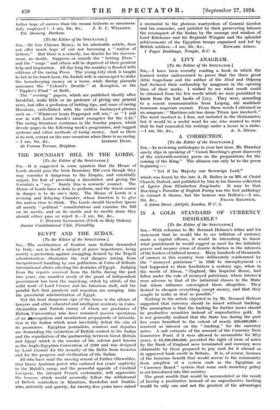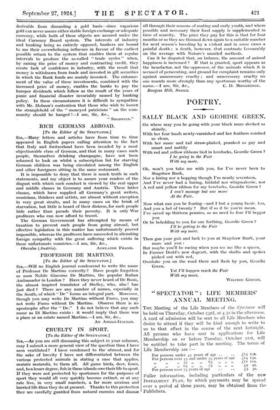IS A GOLD STANDARD OF CURRENCY DESIRABLE ?
[To the Editor of the SPECTATOR.] SIR,—With reference to Mr. Bernard Hobson's letter and his statement that he would like to see inflation of currency made a capital offence, it would be interesting to know what punishment he would suggest as meet for the infinitely graver and meaner crime of drastic deflation in the interests of the lenders of inflated money. Many hundreds of thousands of earners in this country were deliberately condemned by the " moneyed patricians " in 1920 to unemployment r s had happened to their forefathers a century ago, when in the words of Alison, " England, like Imperial Rome, had fallen under the rule of moneyed patricians, whose interes' a were adverse to that of the industrial classes in the State but whose influence outweighed them altogether. They desired to cheapen everything except money, and that they sought to 'make as dear as possible."
Nothing in the article objected to by Mr. Bernard Hobson suggested that currency should be issued without backing. The assumption is that the backing for further issues should be productive securities instead of unproductive gold. It is not generally realized that the State has during the past five years benefited to the extent of nearly £60,000,000— received as interest on the " backing " for the currency notes. A safe estimate of the amount of the Currency Note Guarantee Fund, if it were allowed to accumulate for fifty years, is £2,500,000,000, provided the right of issue of notes by the Bank of England were terminated and currency were obtainable by those prepared to pay cash for it abroad or in approved bank credit in Britain. It is, of course, because of the immense benefit that would accrue to the community from adoption of a system such as the Egyptian or " Currency Board " system that some such monetary policy is not introduced into this country.
The great wealth that would be accumulated as the result of having a productive instead of an unproductive backing would be only one and not the greatest of the advantages derivable from discarding a gold basis—since vagarious gold can never assure either stable foreign exchange or adequate currency, while both of these objects are assured under the ideal Currency Board system. The interests of industry and banking being so entirely opposed, bankers are bound to use their overwhelming influence in favour of the earliest possible return to the system that enables them at regular intervals to produce the so-called " trade cycles " when, by raising the price of money and contracting credit, they create lack of confidence in industry, with the result that money is withdrawn from trade and invested in gilt securities in which the Bank funds are mainly invested. The enhance- ment of the value of these investments, combined with the increased price of money, enables the banks to pay the bumper dividends which follow as the result of the years of panic and financial disaster invariably caused by banking policy. In these circumstances it is difficult to sympathise with Mr. Hobson's contention that those who wish to loosen the stranglehold of the " moneyed patricians " on the com- munity should be hanged !—I am, Sir, &c., " SOLONIAN."







































 Previous page
Previous page